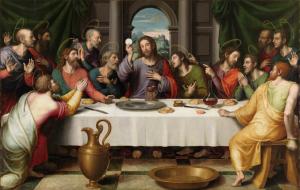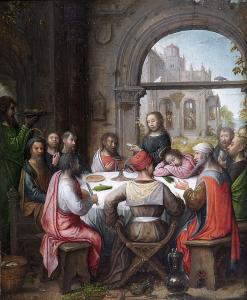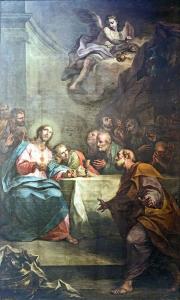 The frenetic pace of Mark’s story, sprinkled liberally with the word “immediately,” slows down noticeably after Jesus’s entry into Jerusalem on the donkey (Mark 11:1-11). The ensuing week, culminating in the empty tomb, consumes fully six chapters, nearly 40% of the tale. After Jesus’s tourist-like and silent observations of the temple compound, and after he leaves the city without any comment, he returns to Jerusalem and falls into confrontation with the religious authorities, as Mark has been predicting from the beginning of his account. Such confrontations will lead directly to Jesus’s capture, torture, death, and resurrection, each element having been prefigured in scripture, and each element important for understanding why Jesus has come into the world, as Mark sees it.
The frenetic pace of Mark’s story, sprinkled liberally with the word “immediately,” slows down noticeably after Jesus’s entry into Jerusalem on the donkey (Mark 11:1-11). The ensuing week, culminating in the empty tomb, consumes fully six chapters, nearly 40% of the tale. After Jesus’s tourist-like and silent observations of the temple compound, and after he leaves the city without any comment, he returns to Jerusalem and falls into confrontation with the religious authorities, as Mark has been predicting from the beginning of his account. Such confrontations will lead directly to Jesus’s capture, torture, death, and resurrection, each element having been prefigured in scripture, and each element important for understanding why Jesus has come into the world, as Mark sees it.
Jesus first returns to the temple, and “began chasing vendors and shoppers out of the temple area, turned the bankers’ tables upside down, along with the chairs of the pigeon merchants; he wouldn’t even let anyone carry a container through the temple area” (Mark 11:15-16). He began to teach: “Do not the scriptures say, ‘My house is to be seen as a house of prayer for all people! But you have made it a hideout for crooks’ (traditionally “den of robbers”) (Mark 11:17). Mark is here using, as he regularly does, Greek Old Testament texts to make his points about what Jesus is doing and saying. He first quotes Isaiah 56:7, that prophet’s attack on the religious authorities of his day and their ill treatment of those they called pagan. Israel should be, as the earlier 2-Isaiah avowed, “a light to the nations” (Is.49:6 and 51:4), rather than an exclusive club for the Jews only. In this way, Mark connects Jesus’s inclusive understanding of the object of his ministry that includes all people with his construal of the ancient prophets who thought of YHWH in the same way.
Furthermore, by claiming that the Jews of the day have made the temple into a “hideout for crooks,” Mark quotes Jeremiah 7:11, who in the midst of a scathing sermon against his priestly colleagues in the 7th century BCE, makes the same point that the temple, created and used as a sanctuary and a light for all people, has become instead a place where “crooks” reside, those who care nothing for the Torah, but who come to the temple claiming to live by that Torah by making the prescribed offerings, but caring only for profit, selling trinkets and birds to those truly trying to do what they have been asked by their sincere faith to do. The temple obviously needed cleansing in Jeremiah’s day, and things have not improved, according to Mark, in the succeeding 700 years.
The material in chapters 12 and 13 I have already examined in previous posts, including the parable of the vineyard, the payment of taxes, the absurd question about marriage in the age to come, the signs of the reign of God, among other issues. At the beginning of Mark 14, the opposition has grown so virulent against Jesus among the religious authorities that they continue to plot ways “to arrest him by trickery and kill him” (Mark 14:1). And it is the quite moving story of the woman who breaks her jar of expensive perfume with which she anoints Jesus’s head, and his reply that she has done something quite important, a deed that “will also be told in memory of her” (Mark 14:9), that precipitates Judas Iscariot to rush off to the priests, looking for payment for turning Jesus over to them. Then, the disciples ask Jesus where he would like to celebrate the Passover meal, since the time had come for the yearly festive act. They discover, at Jesus’s express request and exact description, “a large upstairs room that has been arranged” (Mark 14:15).
When evening arrives, at sundown as all Jews wait for it, Jesus and his disciples recline at table and are eating. Such a posture while eating is the fashion of the time (Mark 2:15), but the comfortable table chat is shattered by Jesus’s sharp accusation, “Without question, one of you eating with me is going to turn me in” (Mark 14:18)! In the inevitable hubbub after that astonishing allegation, they each in turn say to Jesus, “Not I, is it?” But Jesus replies, “It is one of the twelve, the one who is dipping into the bowl with me…Better for that man never to have been born” (Mark 14:20-21)! And with that they all begin the Passover ritual, which for Christians has become the institution of the Last Supper or Holy Communion, a practice maintained in all Christian churches since the very beginning of their existence, and along with baptism constitute the basic marks of Christian worship. But Mark’s particular way of contexting the ritual makes it reel with pain and anguish and questions without easy answers.
Jesus breaks the Passover bread, offers it to them, and says, “Have some, this is my body,” and after that he grabs the Passover cup (perhaps the cup of Elijah, that cup that signals hope for the bringer of justice to appear at the table?), and says, “This is my blood of the covenant that has been poured out for many” (Mark 14:22-24). He then adds, “I tell you I will not drink of the fruit of the vine again until the day I drink it for the first time in God’s domain” (or “when God rules”) (Mark 14:25)!
The careful reader will note that the sequence of the Last Supper ritual is identical to the feeding stories earlier in the gospel (Mark 6:41, 8:6). In addition, Mark’s use of the “blood of the covenant” arises from Exodus 24:8 where Moses takes the blood from sacrificial oxen, dashing half of it on the altar and half on the assembled people in order to symbolize a binding commitment between YHWH and the people of Israel. After that ritual is complete, Moses and his closest followers, his inner circle, go up the sacred mountain, “see God” and “eat and drink” (Ex.24 :9-11). We recall the transfiguration event where Jesus is connected to Moses and eventually is said to surpass him. Here again Jesus acts in the footsteps of the lawgiver of Israel and binds his disciples to him and to his God in commitment and service.
However, after they all join in singing the Passover hymns (traditionally said to be Psalms 115-118), again Jesus stops the festivities with another terrible announcement: “You will all lose faith,” and though Peter, the so-called Rock, shouts that he will never lose faith in Jesus, Jesus says, “I tell you tonight before the rooster crows twice you will disown me three times” (Mark 14:29-30). And so Peter will, as we will see as Mark continues to paint his dark tale.
I have always found it odd that the church’s weekly or monthly reenactment of this scene rarely if ever puts the meal in its proper gospel context. The meal is always described to the participants as the very sign of Jesus’s gift of grace, unmerited and unearned, and surely it is that. But Mark makes that reality so vivid as he begins the meal with the announcement of inevitable betrayal, and ends it with the proclamation that we all will lose faith. I cannot speak for you, but such a context would put me off the bread and cup rather than make me anxious to receive them. Is it not important to add these dire warnings to the meal so that we do not become sanguine in our reception of it? Is it any wonder that in harsher days slaveholders were denied communion as long as they held people in bondage, at least in the early days of Methodism? And though I staunchly disagree with the action of certain priests, is it any wonder now that they would withhold the eucharist from certain politicians who uphold the right of a woman to make her own choices about her unborn child? Communion once was, and remains for some, a very serious matter, the inability to partake imperiling one’s immortal soul.
I am not suggesting that we return to such hazardous times in our ritual practice, but I am saying that we should take the act of communion far more seriously than we do. Perhaps this Maundy Thursday when we partake of the elements, however we do that act, that we remember the words of Jesus before and after the familiar words of institution: you all will fail me; you all will lose faith. It is unfortunately what it means to be a follower of this demanding one; it means to fail. It means to be afraid to follow; it means to deny him in more ways than we can count. It means to claim unbending devotion, and then to fail miserably in that devotion. But still, in just three day’s time, the empty tomb will announce that disciples, even and especially Peter, the chief denier, will witness the power of God in a way unprecedented, and failure and loss of faith will not finally preclude the love of this God for all. Easter is coming! Thanks be to God!
(Images from Wikimedia Commons)











